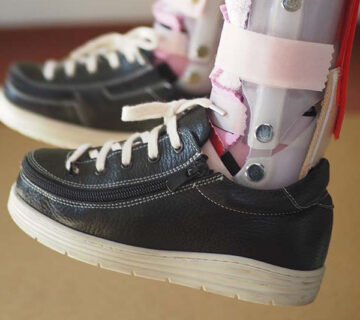Walking Towards Independence: Examining if NDIS Specialised Footwear Meets the Necessary Criteria
For individuals with disabilities, finding suitable footwear that promotes independence and mobility is an ongoing challenge. The National Disability Insurance Scheme (NDIS) aims to provide support and resources to Australians with disabilities, ensuring they can live fulfilling lives. As part of this initiative, specialised footwear has gained recognition as a potential solution to improve mobility and comfort.
Understanding the importance of specialised footwear for individuals with disabilities
When it comes to individuals with disabilities, footwear is more than just a fashion statement. It plays a crucial role in promoting mobility, stability, and overall comfort. Specialised footwear is designed with the specific needs of individuals with disabilities in mind, offering features such as extra support, cushioning, and adjustability.
One of the primary benefits of specialised footwear is its ability to enhance independence. By providing the necessary support and stability, individuals can navigate their surroundings with confidence and reduced risk of falls or injuries. Additionally, specialised footwear can alleviate discomfort and pain associated with certain conditions, allowing individuals to engage in daily activities more comfortably.
However, it is important to recognize that not all individuals with disabilities require specialised footwear. The suitability of this type of footwear depends on the specific needs and conditions of the individual. Factors such as foot shape, gait abnormalities, and the presence of underlying medical conditions should be taken into consideration when determining the appropriateness of specialised footwear.
Criteria for NDIS funding for specialised footwear
The NDIS operates on the principle of providing reasonable and necessary support to individuals with disabilities. When it comes to specialised footwear, the NDIS has specific criteria that must be met for funding to be approved.
One of the key criteria is that the footwear must be directly related to the individual’s disability. This means that the footwear should address a specific need or condition related to the disability, such as providing stability for individuals with balance issues or accommodating foot deformities.
Additionally, the footwear must be considered reasonable and necessary in terms of cost-effectiveness. This means that the NDIS will assess whether the benefits of the specialised footwear outweigh the costs. Factors such as the individual’s functional capacity, the impact on their daily life, and the availability of alternative options will be taken into consideration.
Lastly, the NDIS requires that the footwear be prescribed by a qualified healthcare professional. This ensures that the footwear is appropriate for the individual’s specific needs and is tailored to their unique circumstances. The healthcare professional will assess the individual’s condition, consider any medical recommendations, and make an informed decision regarding the suitability of specialised footwear.
Evaluating the effectiveness of NDIS specialised footwear
Real-life experiences provide valuable insights into the impact of specialised footwear on independence and mobility. By hearing from individuals who have used NDIS-funded specialised footwear, we can gain a deeper understanding of its effectiveness.
One such individual is Sarah, who has cerebral palsy and struggles with balance and coordination. After receiving NDIS funding for specialised footwear, Sarah noticed a significant improvement in her ability to walk independently. The added stability and support provided by the footwear allowed her to navigate her surroundings with greater confidence, reducing her reliance on mobility aids.
Another example is James, who has arthritis in his feet and ankles. The NDIS-funded specialised footwear provided him with much-needed cushioning and shock absorption, alleviating the pain and discomfort he experienced during walking. This improvement in comfort enabled James to engage in activities he previously had to avoid, such as walking for longer periods or participating in social events.
These testimonials highlight the positive impact that NDIS specialised footwear can have on individuals’ lives. However, it is important to note that the effectiveness of specialised footwear may vary depending on the individual and their specific needs. In the next section, we will explore some of the challenges and limitations associated with NDIS specialised footwear.
Challenges and limitations of NDIS specialised footwear
For individuals who do not meet the criteria for NDIS specialised footwear, there are alternative options available that can still provide the necessary support and comfort. These alternatives may include off-the-shelf orthopedic footwear, custom orthotics, or modifications to existing footwear.
Off-the-shelf orthopedic footwear is designed to provide additional support and cushioning for individuals with various foot conditions. These footwear options are readily available and can be purchased without the need for NDIS funding. While they may not offer the same level of customization as specialised footwear, they can still provide significant benefits in terms of comfort and stability.
Custom orthotics are another alternative for individuals who require additional support. These are specially designed insoles that are tailored to an individual’s specific foot shape and condition. Custom orthotics can be used in conjunction with regular footwear, providing the necessary support and alignment to promote better mobility and reduce discomfort.
Modifications to existing footwear can also be an effective solution for individuals with specific needs. This may include adding extra padding, adjusting the fit, or incorporating supportive inserts. Working with a qualified healthcare professional or podiatrist can help individuals identify the modifications that will best meet their needs.
Alternatives to NDIS specialised footwear
Applying for NDIS funding for specialised footwear can be a complex and overwhelming process. However, with the right information and preparation, individuals can increase their chances of a successful application. Here are some tips to navigate the NDIS application process for specialised footwear:
1. Consult with a healthcare professional: Before beginning the application process, consult with a qualified healthcare professional who can assess your specific needs and provide recommendations for specialised footwear. They can also guide you through the application process and provide any necessary documentation.
2. Gather supporting evidence: Collect any relevant medical reports, assessments, or documentation that outlines your condition and the need for specialised footwear. This evidence will strengthen your application and provide the NDIS with a clear understanding of your requirements.
3. Complete the NDIS application form accurately: It is important to carefully fill out the NDIS application form, providing detailed information about your disability, functional limitations, and the impact on your daily life. Be specific about the type of specialised footwear you require and how it will enhance your independence and mobility.
4. Seek assistance if needed: If you find the application process overwhelming, consider seeking assistance from a disability advocate or support service. They can help you navigate the application process, provide guidance, and ensure your application is complete and comprehensive.
5. Follow up on your application: Once you have submitted your application, follow up with the NDIS to ensure it is being processed. Be prepared to provide any additional information or documentation that may be requested.


